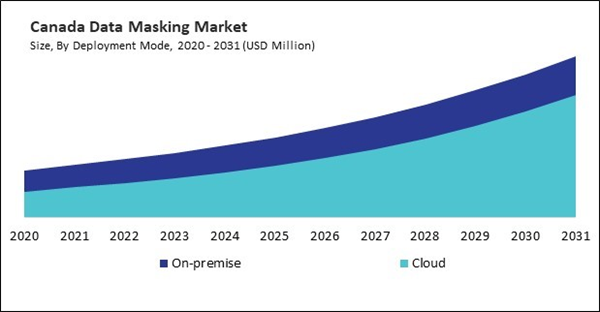The US market dominated the North America Data Masking Market by Country in 2023 and would continue to be a dominant market till 2031; thereby, achieving a market value of $526.2 million by 2031. The Canada market is experiencing a CAGR of 13.5% during (2024 - 2031). Additionally, The Mexico market would exhibit a CAGR of 12.5% during (2024 - 2031).
In finance and banking, data masking is essential for protecting sensitive financial information, including account numbers, transaction details, and customer identities. By masking this information, financial institutions can prevent unauthorized access and fraud while complying with regulations like the Payment Card Industry Data Security Standard (PCI DSS) and safeguarding customer trust. Retail and e-commerce companies also handle vast customer data, including payment card details, purchase history, and personal preferences. Data masking helps protect this information from unauthorized access or exposure, reducing the risk of fraud and enhancing customer trust in data security practices.
Furthermore, government agencies and public sector organizations deal with sensitive citizen information, including social security numbers, tax records, and demographic data. Data masking protects this information from unauthorized access or misuse, ensuring compliance with privacy regulations and maintaining public trust in government services. Data masking is used in the manufacturing and supply chain sector to protect sensitive intellectual property, trade secrets, and proprietary information. By masking this information, manufacturers can prevent industrial espionage, safeguard competitive advantage, and comply with regulations governing intellectual property rights.
As the telecommunication sector grows, there's likely to be a corresponding increase in the volume of sensitive data transmitted over networks. This includes personal information, financial data, and proprietary business information. Hence, the increasing regional telecommunication sector and IT industry is driving the market's growth.
Based on Deployment Mode, the market is segmented into On-premise and Cloud. Based on Component, the market is segmented into Solution and Services. Based on Type, the market is segmented into Dynamic and Static. Based on Business Function, the market is segmented into Finance, Operations, Sales & Marketing, Legal and Human Resource (HR) & Others. Based on Enterprise Size, the market is segmented into Large Enterprise and Small & Medium Enterprise. Based on End-use, the market is segmented into BFSI, Government, Healthcare, IT & Telecom, Media & Entertainment, Manufacturing, Retail & eCommerce and Others. Based on countries, the market is segmented into U.S., Mexico, Canada, and Rest of North America.
List of Key Companies Profiled
- IBM Corporation
- Oracle Corporation
- Informatica Inc.
- Micro Focus International PLC (Open Text Corporation)
- Broadcom, Inc. (CA Technologies, Inc.)
- Solix Technologies, Inc.
- Delphix Corp. (Perforce Software, Inc.)
- ARCAD Software
- Innovative Routines International (IRI), Inc.
- Ekobit d.o.o. (Span Plc)
Market Report Segmentation
By Deployment Mode- On-premise
- Cloud
- Solution
- Services
- Dynamic
- Static
- Finance
- Operations
- Sales & Marketing
- Legal
- Human Resource (HR) & Others
- Large Enterprise
- Small & Medium Enterprise
- BFSI
- Government
- Healthcare
- IT & Telecom
- Media & Entertainment
- Manufacturing
- Retail & eCommerce
- Others
- US
- Canada
- Mexico
- Rest of North America
Table of Contents
Companies Mentioned
- IBM Corporation
- Oracle Corporation
- Informatica Inc.
- Micro Focus International PLC (Open Text Corporation)
- Broadcom, Inc. (CA Technologies, Inc.)
- Solix Technologies, Inc.
- Delphix Corp. (Perforce Software, Inc.)
- ARCAD Software
- Innovative Routines International (IRI), Inc.
- Ekobit d.o.o. (Span Plc)









